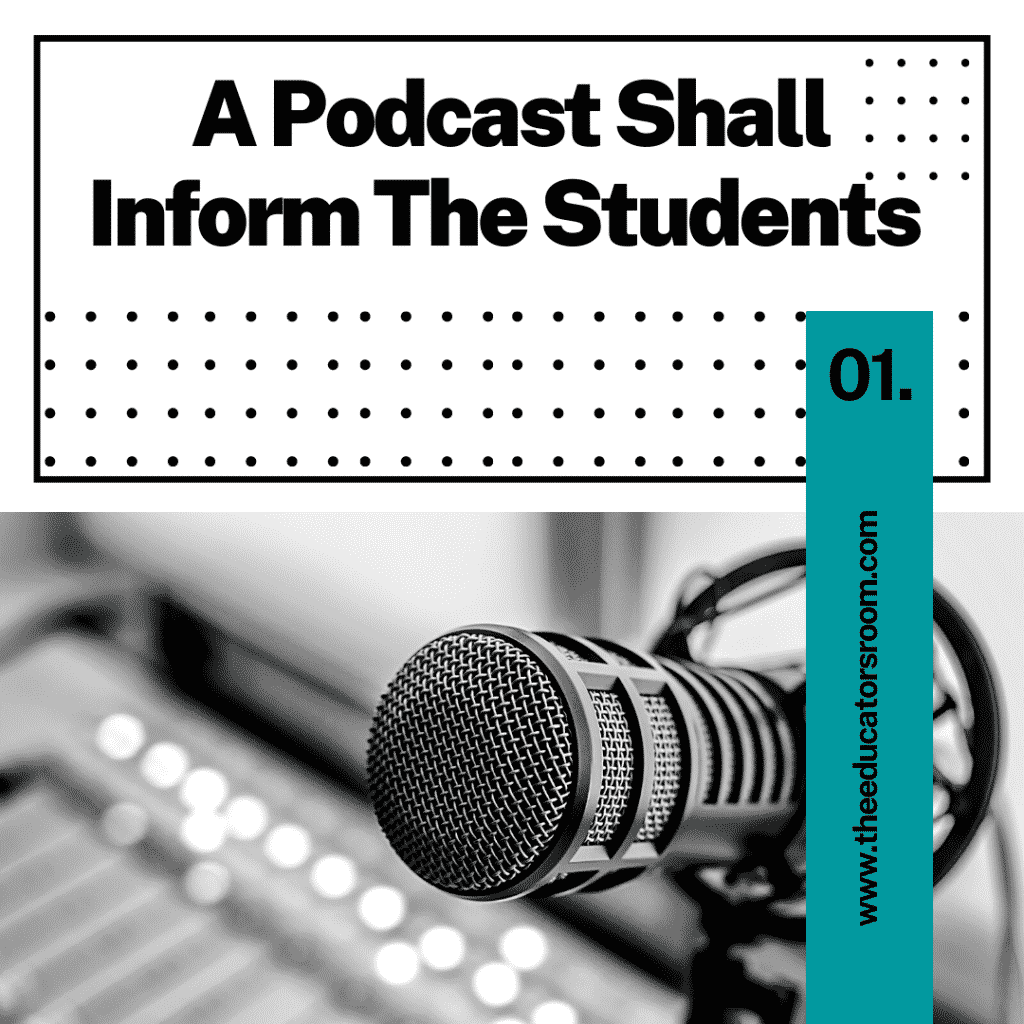Could podcasts kill the video star?
“What the ____ is a podcast?”
An eleventh-grade student who would go on to be accepted at an Ivy League school asked this question in response to my question: “OK, guys, how do y’all feel about creating a podcast?”
Don’t get the idea that this interaction took place “back in the day.” I believe this was 2016…2017 maybe. Podcasts were taking off (again), and the educational program I was working for at the time could have been on the cutting edge of real-world communication education just by taking on this challenge. Why did this endeavor fail?
Answer: the approach was all wrong. In fact, it was so wrong, that this failure epitomizes why and how we fail in many educational endeavors. Fortunately, the accidental success with some podcasts shows how newish ideas should be approached and adapted.
Achieving Failure
The failure needs some context. The students and I were trying to keep a longstanding cultural journalism class going. We put out two eighty-page, ad-free magazines each year that were mailed to international subscribers, some of them lifetime subscribers. The program that once included multitudes of students and support staff–especially when the program included a skeet shooting component–had dwindled to about a dozen students. Selling students on an elective where writing is the main focus has its challenges regardless of how low you dangle student choice and scholarships.
The off-campus program, which worked in tense cooperation with the local school system, had recently replaced a much-beloved administrator with one who loved himself with an equivalent passion. He was, however, a fresh perspective in a program that was starting to buckle under its own traditions, so we asked what he could do to help us get the magazine out to subscribers faster and create content that was more relevant in the modern world.
His answer: “Create a podcast. Print is dead.”
“But we have to get the magazine out to subscribers.”
“Tell the students that we’re going to start a podcast. You’ll see.”
I did. That’s when I got the question above from a student who is probably now (2021) running a podcast about graduating from an Ivy League school. I’m not sure that the students really didn’t want to do a podcast back then. It’s just that we were up to our eyeballs in transcriptions for a magazine with a fifty-year history. The magazine and the program carried with them a legacy and a responsibility that the new program administrator didn’t seem to care about. Print may have been dead, but the subscribers were alive and wanting what they paid for.
Then, the program administrator decided to take the podcast part over himself. None of this worked. Ironically, the program is one that prides itself on student choice, and at the time, the students weren’t really listening to podcasts. The students were caught between the Scylla of having to produce writing for a magazine that their grandparents had chosen and the Charybdis of a podcast platform that meant nothing to them at the time.
Something should have told us that we would eventually lose our entire crew this way.
Achieving Success
“Mr. Blackstock, what if, instead, we created a podcast episode?”
Skip ahead about four years. I was not teaching/facilitating the same program at that time. I was teaching the Dramatic Writing Class (sponsored by the Georgia Film Academy). We were about to start the fourth academic quarter at the high school, and the students and I had, together, experienced several real-world writing opportunities. They had several choices for major projects and could, in fact, invent their own as long as the proposals accomplished our goals and met our standards. One of the students wanted to script and record a podcast.
Not wanting to squelch student choice, I said, “Well, OK, we’ll give it a shot.”
“Hey,” another student said, “I want to do that, too.”
I ended up with three podcasts—scripted, recorded, uploaded, published, and distributed. And I loved them. At the time, they were the best podcasts I’d ever heard. They were educational in that I learned something, they were pleasant in that the students created or even played original background music, and they were relevant, two of them being about art history.
The previous podcasts that I had heard reminded me of the old vlogs and the original YouTube videos where everyone just wanted to complain, no one seemed sober, and none of the conversations had any point or focus.
This made me wonder, “What the ____ is a podcast?” I thought I knew, but I was wrong.
In my defense, I’m old enough to have been an adult when the internet really took off. Amateur websites, in the beginning, were mainly self-serving confessionals of other people’s sins. Then, publishing became even easier as students could share anything on sites like “My So-Called Life” and the “FML Journal.” Then, teachers could include technology in their classes by allowing students to forgo essays. They would, instead, use technology by recording videos of flies finding places to land in their graded efforts to prove they had read and appreciated Lord of the Flies. Skepticism may be understandable.
But there’s a difference today than there once was, especially among students. Many readers aren’t going to like this difference because it sounds elitist, but here’s the difference: Students who have something to add to society often want to be heard, not necessarily to be seen. Even the art history podcasts included links to the paintings and sculptures, so we really didn’t need a video. When students showed me podcasts that they liked, the fictional ones often required imagination and the nonfiction podcasts presented ideas and rhetorical strategies that rivaled the essays in my AP English Language classes. Keep in mind that I wasn’t assigning these podcasts as homework. Students were showing me these podcasts because they listened to them in their own time.
Furthermore, podcasts may have an inherent saving grace: Students who want to be seen but really have nothing to say will seek their fifteen minutes of fame on other mediums and hosts. It’s hard to imagine, for example, a “devious licks” podcast. The people who have those interests have a place to go. If, as a high school student, I want to tear up a school bathroom and/or record flies landing on dog poop, I got Tik-Tok, and next year, I’ll have whatever replaces it. The new kids on the Ivy League block, though, will have podcasts where they discussed ideas that were important to them in a public forum that they can reference on college applications and on resumés.
The prime benefit of using podcasts in education is that we can turn consumers into producers. They work collaboratively, learn social skills, take ownership, produce organized and scripted information for an authentic audience, etc. They still have to read, write, and research, but if they share through podcasts, they don’t just write for a teacher and throw the graded paper into the “Futility Closet” (which, by the way, is the name of a podcast I’ve been listening to lately).
Is the Future Podcasts?
No one should believe that podcasts, themselves, will be the deus ex machina that saves us from having to teach communication skills, but then, no one promised us that rose garden, to begin with. Certainly, helping students learn and share via podcasts has its drawbacks, time constraints, and even some technological considerations. More importantly, as we’ve seen with all the changes, technological or otherwise, human nature remains an obstacle to human progress. With all of the output, will there be any meaningful intake?
I was on an advisory committee with other fine arts teachers several years ago. We met with the superintendent and the architect. We met often. Every time we turned around, we were leaving our classes to meet with the superintendent and the architect, but none of our suggestions ever made any impact on the actual building plans. When I asked why we kept meeting if our ideas were just going to be ignored, I was told that teachers had given plenty of input and that the architect knew what he was doing.
As my dad said when I told him about this, “There seems to be plenty of input but no intake.”
Will podcasts experience the same ironic irrelevance? If everyone is uploading podcasts, will podcasts have any audience for the audience’s sake? Put bluntly, if everyone is talking, will anyone be listening? If no one is listening, will podcasts just become another social media free-for-all that makes no impact and that essentially has no value?
Podcasts would not be the first medium to fall victim to their own success. For example, Noel Coward once said that “Television is for appearing on—not for looking at.” Similarly, we often hear people say that only poets read poetry, and speaking of mediums, many people write for a popular blogging site where the majority of articles are simply about how to write for that blogging site. Ultimately, podcasts may simply provide a way for passionate broadcasters to shout their barbaric yawps into a swirling pool of other similar yawps.
Why, then, would this format have any value in education today?
…because formats rise and set, but communication skills abideth forever.
The skills that we taught—that we learned—to publish magazines, books, radio shows, websites, blogs, vlogs, blogs again, podcasts…whatever…are still valuable. We should still teach standards and set goals, but our future leaders should have input about the format of their output. With a little intake, I at least learned what a podcast was.







